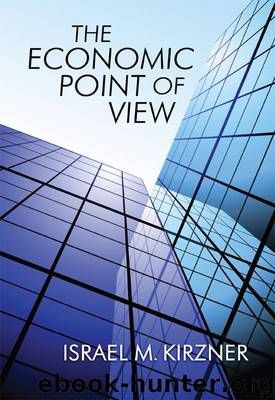The Economic Point of View by Israel M. Kirzner

Author:Israel M. Kirzner [Israel M. Kirzner]
Language: eng
Format: epub
ISBN: 978-1-6101-6282-1
Publisher: Sheed and Ward, Inc.
Published: 1976-11-06T16:00:00+00:00
The Character of Robbins’ Definition
Robbins was at some pains to point out that the conception of economics that he expounded had an entirely different character from that of the previously accepted conceptions of the subject. The earlier definitions had almost invariably been classificatory, marking off certain kinds of behavior, i.e., behavior directed to certain types of ends, as the subject matter of economics. Robbins’ own formulation, on the other hand, is analytical. It “does not attempt to pick out certain kinds of behavior, but focuses attention on a particular aspect of behavior, the form imposed by the influence of scarcity.”16 Hitherto it had been believed possible to describe certain acts and activities as being “economic”; Robbins’ definition, however, does not consider the adjective “economic” as at all appropriate for the description of any act as such, but sees it as singling out a point of view from which actions may be examined. Whereas the earlier definitions of economic affairs had searched for criteria sufficiently comprehensive, and yet sufficiently exclusive, to describe accurately a given class of acts, Robbins’ definition sets forth the particular interests that actuate the singling out of the economic aspect of an act. An act pertains to economic science in so far as it reveals the consequences of a compulsion to allocate scarce resources among conflicting ends. Robbins’ formulation thus differs from others perhaps less in its choice of a criterion for definition than in its radically different conception of the kind of idea that is to be defined.
The critics subjected this feature of Robbins’ contribution to close attention and expressed a wide range of opinions concerning its validity and significance. Writers who hailed Robbins’ book as an auspicious turning point in the conception of economic science and who viewed his definition as a final and definitive pronouncement on the particular problem with which it grappled saw one of its principal merits in this concern with an aspect of action rather than with a particular kind of action.17 Writers assessing the difference between Robbins’ definition and earlier attempts recognized this approach as one of the most significant features of his contribution.18 Those who have described (and deplored) Robbins’ definition as the “dominant academic doctrine” have had especially in mind its lack of concern with the particular ends involved and its concentration on viewing action from a given “aspect.”19
As the essential component of Robbins’ definition, this disregard for the kinds of ends pursued in action had certain further consequences that aroused lively discussion. Perhaps the foremost of these is the ethical neutrality of the economic point of view as set forth by Robbins. If the economist is, as such, exempted or interdicted from choosing particular ends of action as his special concern, then the results of his researches will be achieved with ethical indifference towards the data with which he deals. This consequence of the definition of economics in terms of a particular aspect of action is reserved for separate discussion later in this chapter.
Two implications of this ethical neutrality have led to sharp criticism of the definition as a whole.
Download
This site does not store any files on its server. We only index and link to content provided by other sites. Please contact the content providers to delete copyright contents if any and email us, we'll remove relevant links or contents immediately.
International Integration of the Brazilian Economy by Elias C. Grivoyannis(111059)
The Radium Girls by Kate Moore(12028)
Turbulence by E. J. Noyes(8049)
Nudge - Improving Decisions about Health, Wealth, and Happiness by Thaler Sunstein(7706)
The Black Swan by Nassim Nicholas Taleb(7129)
Rich Dad Poor Dad by Robert T. Kiyosaki(6632)
Pioneering Portfolio Management by David F. Swensen(6300)
Man-made Catastrophes and Risk Information Concealment by Dmitry Chernov & Didier Sornette(6019)
Zero to One by Peter Thiel(5802)
Secrecy World by Jake Bernstein(4753)
Millionaire: The Philanderer, Gambler, and Duelist Who Invented Modern Finance by Janet Gleeson(4478)
The Age of Surveillance Capitalism by Shoshana Zuboff(4292)
Skin in the Game by Nassim Nicholas Taleb(4248)
The Money Culture by Michael Lewis(4207)
Bullshit Jobs by David Graeber(4190)
Skin in the Game: Hidden Asymmetries in Daily Life by Nassim Nicholas Taleb(4006)
The Dhandho Investor by Mohnish Pabrai(3765)
The Wisdom of Finance by Mihir Desai(3747)
Blockchain Basics by Daniel Drescher(3582)
